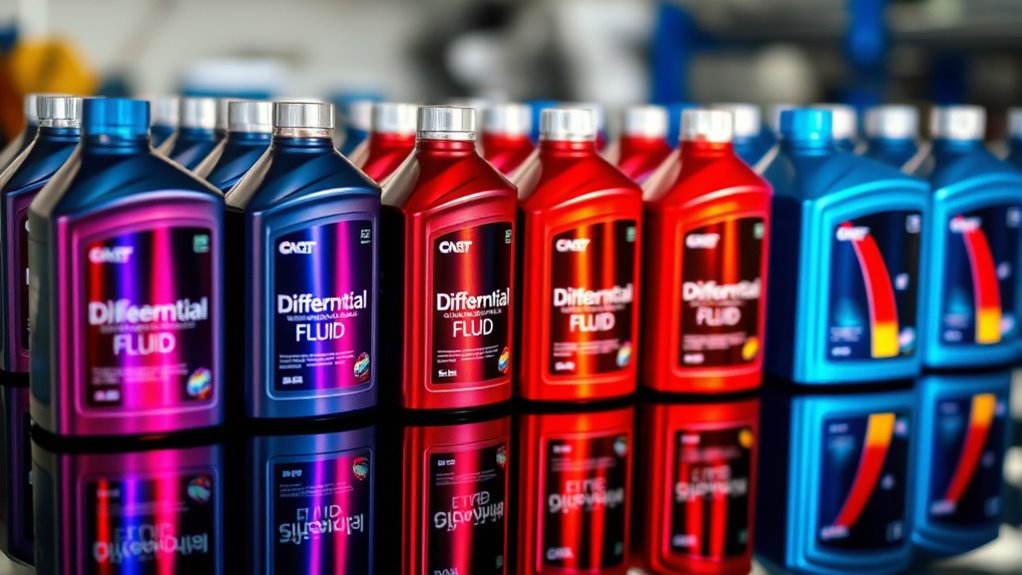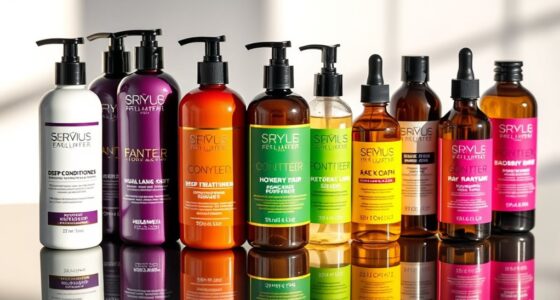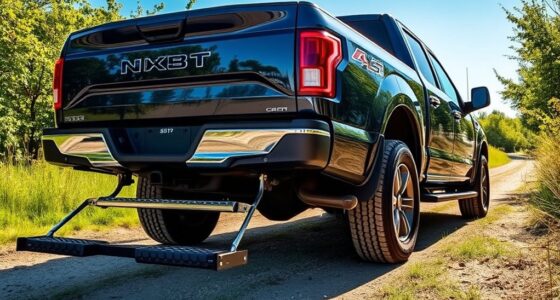If you want your vehicle to run smoothly in 2025, choosing the right differential fluid is key. I recommend synthetic gear oils like Valvoline Advanced Full Synthetic 75W-140 or Mobil1 75W-90 for their durability and broad temperature ranges. OEM fluids like Honda and Toyota options guarantee compatibility and performance. Also, consider additives and viscosity ratings suited for your driving conditions. Keep these factors in mind, and you’ll be well on your way—there’s more to discover as you continue.
Key Takeaways
- Synthetic gear oils like Valvoline Advanced Full Synthetic and TRIAX DTF-2 offer superior protection and performance across extreme temperatures.
- OEM-specific fluids such as Honda and Toyota original oils ensure compatibility, reliability, and proper lubrication for respective models.
- High-quality additives like extreme pressure agents and friction modifiers extend gear lifespan and improve differential operation.
- Viscosity ratings (e.g., 75W-90, 80W-90) and standards (API GL-4/GL-5) guarantee optimal performance and compatibility.
- The best differential fluids provide long-lasting protection, reduce noise, and are suitable for demanding driving conditions and heavy-duty use.
Valvoline Advanced Full Synthetic 75W-140 Gear Oil 1 QT
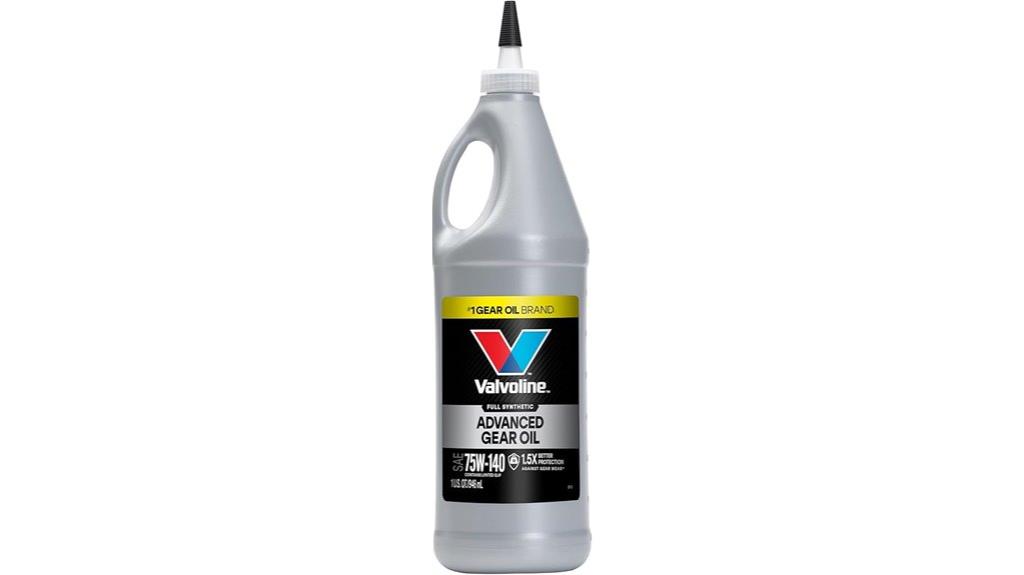
If you’re looking for a gear oil that can handle tough conditions like towing or off-road driving, Valvoline Advanced Full Synthetic 75W-140 Gear Oil 1 QT is an excellent choice. I’ve used it across various vehicles, and it consistently delivers high and low-temperature protection from -22°F to 390°F. It reduces gear chattering, fights rust, oxidation, and corrosion, and contains extreme pressure additives for heavy loads. The limited slip additive ensures smooth clutch operation, and the anti-foaming agents improve longevity. Packaged in a user-friendly squeeze bottle, it’s easy to apply, even in tight spots. This synthetic oil offers top-tier protection that I trust for demanding driving conditions.
Best For: drivers seeking high-performance gear oil that provides exceptional protection in demanding conditions like towing, off-roading, or high-torque applications.
Pros:
- Offers excellent high and low-temperature protection from -22°F to 390°F.
- Reduces gear chattering and protects against rust, oxidation, and corrosion.
- Easy to apply with a user-friendly squeeze bottle, making maintenance straightforward.
Cons:
- Slightly higher cost compared to conventional gear oils.
- May require careful handling to avoid overfilling in tight spaces.
- Some users may need to verify compatibility with specific vehicle models requiring different API classifications.
Valvoline Daily Protection 75W-90 Gear Oil 1 QT
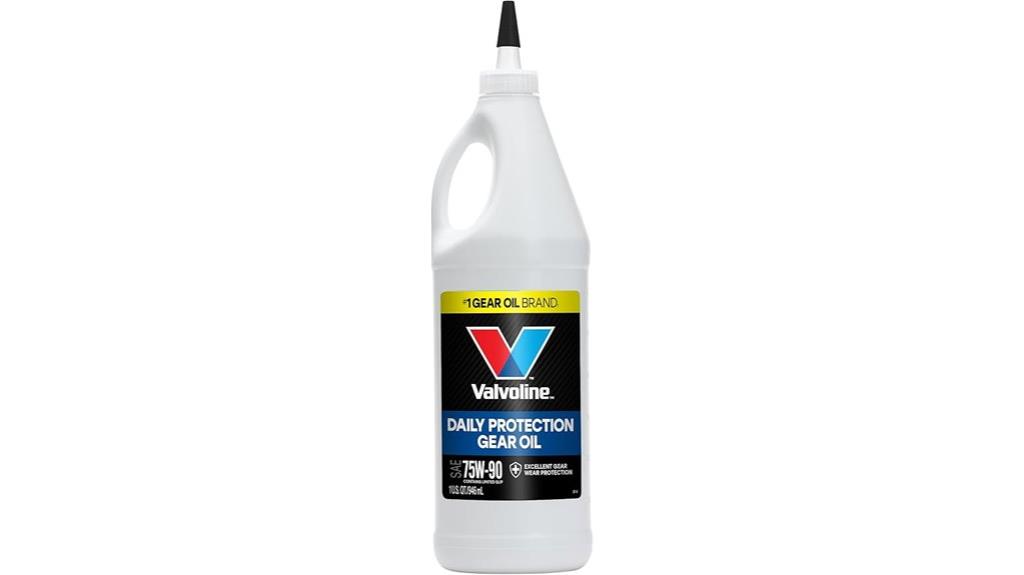
Valvoline Daily Protection 75W-90 Gear Oil 1 QT stands out as an excellent choice for drivers seeking reliable, high-performance lubrication for their light-duty vehicles. This high-quality, conventional gear oil is formulated with sulfur-phosphorus additives and extreme pressure agents, making it perfect for hypoid differentials and manual transmissions. It performs well across a wide temperature range, from -30°F to 350°F, and meets or exceeds API GL-4 and GL-5 standards. Its thermally stable formula reduces noise, protects against rust and corrosion, and guarantees smooth gear engagement. Ideal for passenger cars, SUVs, and trucks, it offers dependable, year-round protection and long-lasting durability.
Best For: drivers of light-duty vehicles, including passenger cars, SUVs, and trucks, seeking reliable, high-performance gear lubrication for hypoid differentials and manual transmissions.
Pros:
- Provides excellent high-pressure and load-carrying performance suitable for towing and heavy-duty use
- Offers reliable protection against rust, corrosion, oxidation, and thermal breakdown
- Ensures smooth gear engagement, reduces noise, and extends gear life
Cons:
- May be less suitable for heavy-duty or off-road vehicles requiring specialized gear oils
- Slightly higher cost compared to conventional oils with lower performance ratings
- Availability might be limited in some regions or stores
Lucas Oil SAE 75W-90 Synthetic Gear Oil (1 Quart)
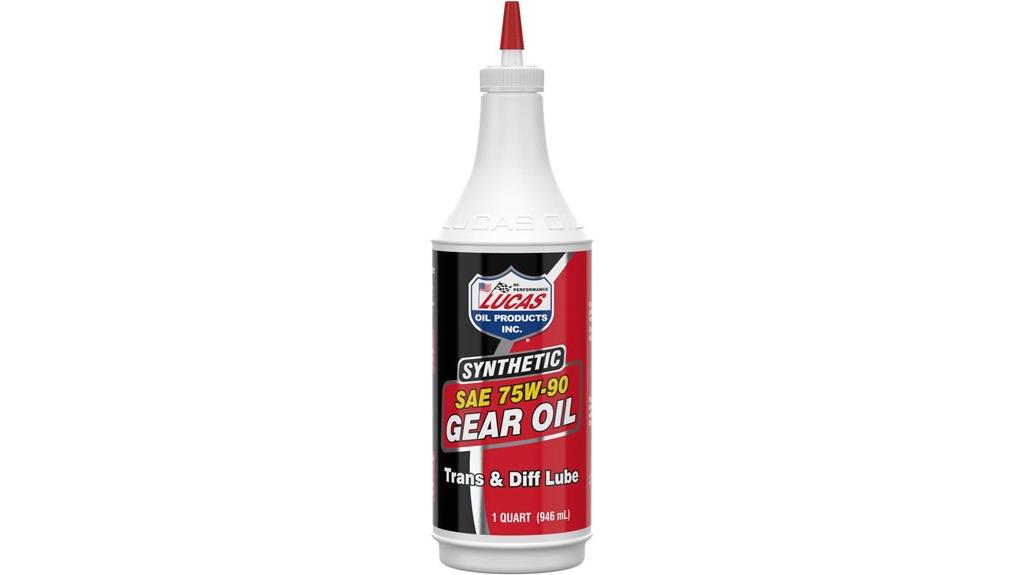
For those seeking a high-performance gear oil that can handle demanding conditions, Lucas Oil SAE 75W-90 Synthetic Gear Oil (1 Quart) stands out as an excellent choice. It’s designed for transmissions and differentials, including limited-slip types and transfer cases, making it versatile for various vehicles like the 2014 Equinox AWD and Nissan Skylines. Its synthetic formulation cushions gears, resists extreme pressure, and performs reliably at high temperatures. Packaged in a 1-quart bottle, it’s easy to use and trusted by many drivers. With positive reviews and a reputation for quality, this gear oil delivers smooth operation and long-lasting protection under heavy-duty and high-performance conditions.
Best For: vehicle owners and enthusiasts seeking a high-performance synthetic gear oil for transmissions, differentials, and transfer cases under demanding and high-temperature conditions.
Pros:
- Exceptional protection for gears under extreme pressure and high temperatures
- Versatile use in limited-slip differentials, transfer cases, and heavy-duty applications
- Easy to apply with a 1-quart bottle and positive customer reviews for reliability
Cons:
- May be more expensive than conventional gear oils
- Requires proper handling and disposal due to synthetic formulation
- Not suitable for vehicles requiring specific OEM gear oils not matching its specifications
TRIAX Synergy Gear MT 75W-90 GL-4 Manual Trans Fluid
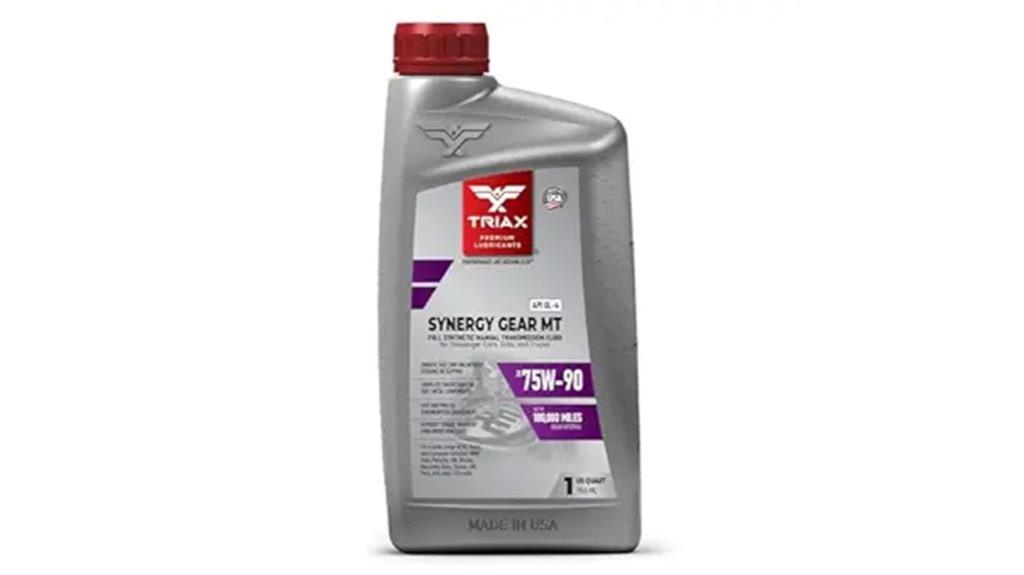
The TRIAX Synergy Gear MT 75W-90 GL-4 Manual Trans Fluid stands out as a versatile choice for drivers seeking reliable transmission performance across a wide range of vehicles. It’s compatible with manual transmissions from top brands like Jeep, BMW, VW, Ford, and Toyota, meeting OEM standards for durability and performance. Its synthetic formulation ensures smooth shifting, even in cold weather, and offers excellent gear protection during high-speed, off-road, or racing conditions. With drain intervals of over 100,000 miles, this fluid provides long-lasting reliability at a cost-effective price, reducing maintenance costs while maintaining ideal transmission operation.
Best For: drivers seeking a cost-effective, long-lasting synthetic gear oil compatible with a wide range of manual transmissions from top automotive brands, suitable for high-performance, off-road, or daily driving conditions.
Pros:
- Compatible with major OEM standards and a variety of vehicle makes including Jeep, BMW, VW, Ford, and Toyota.
- Offers excellent cold weather shifting and high-temperature gear protection due to its full synthetic formulation.
- Extended drain intervals of over 100,000 miles reduce maintenance frequency and costs.
Cons:
- May require more frequent checks or top-offs in extreme driving conditions despite long drain intervals.
- Some users may experience initial shifting issues in older, high-mileage vehicles.
- Not specifically formulated for vehicles requiring a GL-5 or different gear oil specification, limiting compatibility in certain transmissions.
Genuine Honda Fluid 08200-9003 VTM-4 Differential Fluid – 1 Gallon Bottle
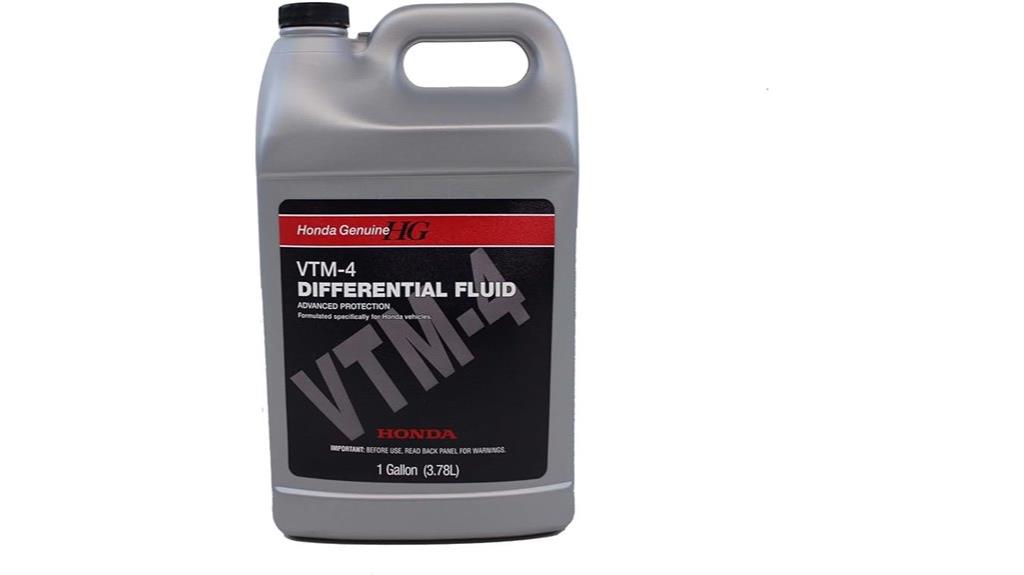
If you’re looking for a reliable differential fluid specifically designed for Honda vehicles, the Genuine Honda Fluid 08200-9003 VTM-4 stands out as a top choice. This OEM factory original fluid, made in Japan, comes in a 1-gallon bottle and is perfect for VTM-4 differentials in models like the CRV and Acura MDX. It’s rated to handle temperatures up to 265°F, providing excellent lubrication and protection under high heat. Customers praise its OEM quality, reliability, and ease of use. With a high rating of 4.8 stars from over 2,000 reviews, it’s a trusted option for maintaining your Honda’s differential system.
Best For: Honda and Acura vehicle owners seeking a high-quality OEM differential fluid to ensure optimal lubrication and protection for VTM-4 differentials under high-temperature conditions.
Pros:
- OEM factory original quality manufactured in Japan for reliability and performance
- Rated to withstand high temperatures up to 265°F, ensuring protection under demanding conditions
- Highly rated with 4.8 stars from over 2,000 reviews, indicating customer satisfaction and trust
Cons:
- Minor leakage reported during shipping, which may require careful handling or resealing
- Only available in a 1-gallon size, which might be more than needed for small maintenance tasks
- Limited to Honda vehicles with VTM-4 differentials, not suitable for other makes or models
Honda Genuine 08200-9007 Dual Pump II Differential Fluid
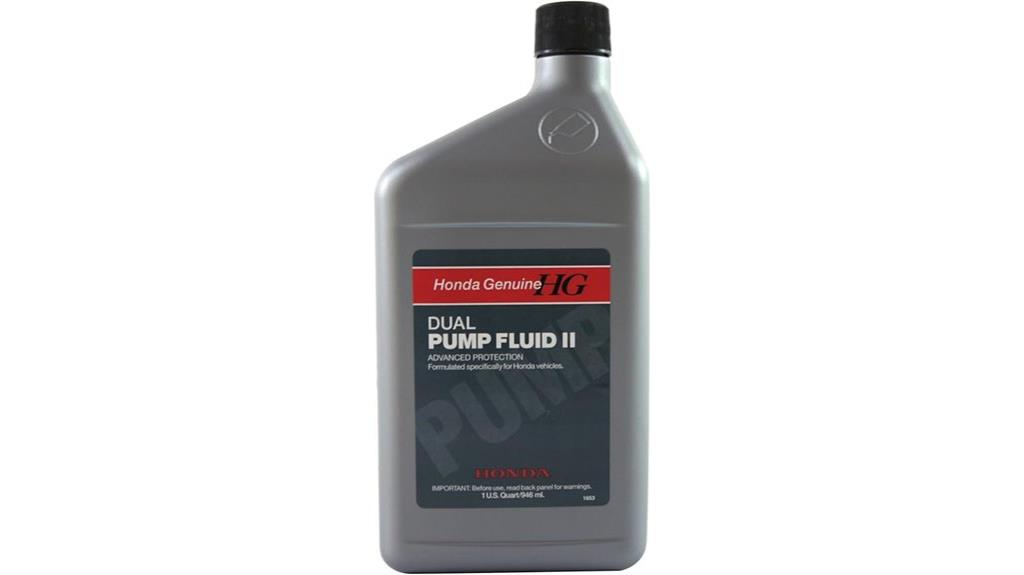
Looking for a reliable differential fluid specifically designed for Honda vehicles? The Honda Genuine 08200-9007 Dual Pump II Differential Fluid is an OEM product made for rear differential maintenance in models like CR-V, Pilot, Ridgeline, and more. It’s resistant to high-temperature breakdown, ensuring long-lasting protection. Packaged in a convenient jug, it contains 0.1 liters of mineral or synthetic oil, meeting strict Honda quality standards. Customers praise its performance, ease of use, and OEM authenticity. Although pricier, many find it worth the investment for maintaining their vehicle’s warranty and ideal operation. This fluid is a trusted choice for Honda owners seeking peace of mind.
Best For: Honda vehicle owners seeking OEM-quality rear differential fluid for models like CR-V, Pilot, Ridgeline, and others to ensure optimal performance and warranty protection.
Pros:
- High-quality OEM Honda formula ensures perfect compatibility and protection
- Resistant to high-temperature breakdown, providing long-lasting durability
- Easy to install with clear instructions and positive user reviews
Cons:
- Higher cost compared to generic or aftermarket differential fluids
- Limited to specific Honda models, not suitable for non-Honda vehicles
- Contains a small volume (0.1 liters), requiring precise measurement during filling
Lucas Oil 10046 SAE 80W-90 Heavy Duty Gear Oil – 1 Gallon
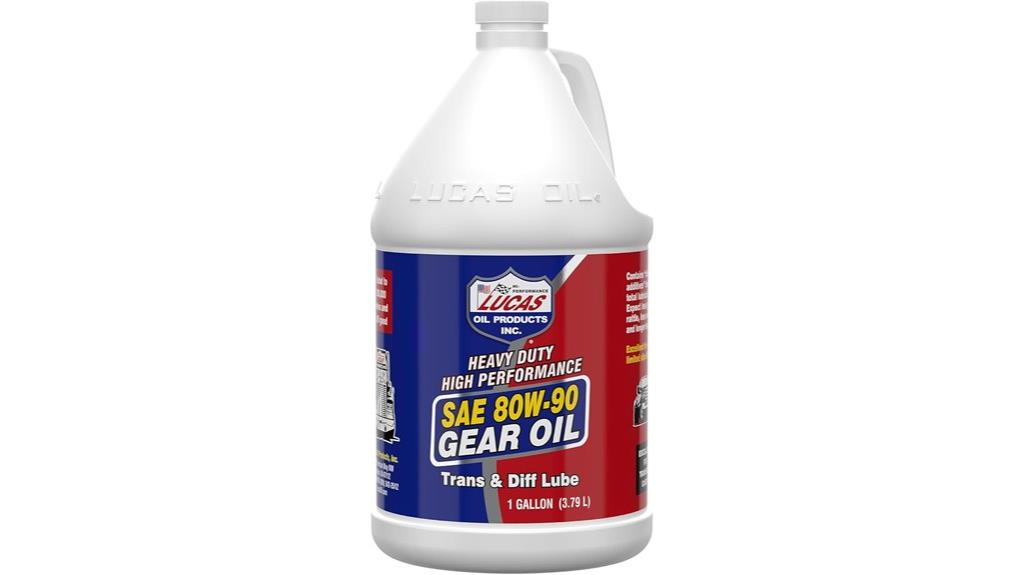
For those demanding heavy-duty protection, Lucas Oil 10046 SAE 80W-90 Heavy Duty Gear Oil stands out as an excellent choice. This high-performance lubricant features advanced anti-wear agents and superior lubricity, reducing gear wear and minimizing drag. It helps control heat buildup, ensuring your gears stay cool and operate smoothly under tough conditions. Suitable for gearboxes, differentials, and transmissions, it’s designed to extend oil life and improve durability. Users report quieter operation, smoother shifting, and better protection during heavy loads. Packaged in a convenient 1-gallon bottle, it’s a reliable, cost-effective option for demanding applications.
Best For: Heavy-duty vehicle owners and operators seeking reliable, high-performance gear lubrication for gearboxes, differentials, and transmissions under demanding conditions.
Pros:
- Provides exceptional anti-wear protection and reduces gear wear
- Enhances heat dissipation for cooler, smoother operation
- Extends oil life and operational durability, reducing maintenance costs
Cons:
- Slightly higher cost compared to standard gear oils
- May require more frequent handling or pouring due to container size
- Not suitable for applications requiring specialized or lower-viscosity gear oils
Lucas Oil 10043 SAE 80W-90 Heavy Duty Gear Oil – 1 Quart
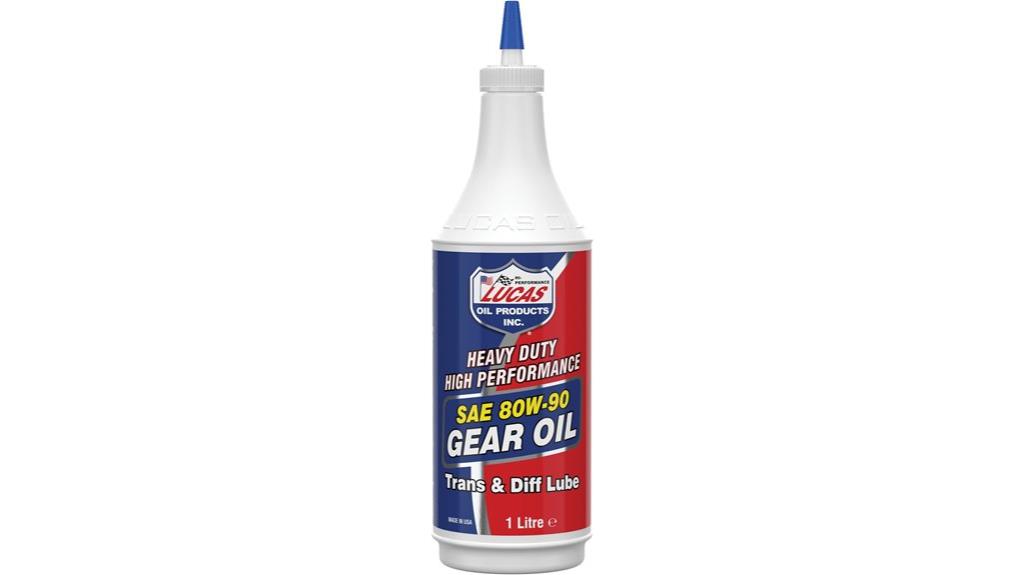
The Lucas Oil 10043 SAE 80W-90 Heavy Duty Gear Oil stands out as an excellent choice for those needing reliable lubrication in demanding gear systems. I’ve found it to provide exceptional protection against wear, thanks to its advanced anti-wear and lubricity agents. It reduces heat buildup and minimizes gear noise, ensuring smoother operation under heavy loads. Its high film strength works well in various applications like differentials, gearboxes, and final drives. Customers love its ability to extend equipment life and keep vintage machinery running quietly. Packaged in a durable quart bottle, it’s a versatile, high-performance lubricant that delivers consistent results in tough environments.
Best For: vehicle owners and heavy-duty machinery operators seeking reliable, high-performance gear lubrication for gear systems, differentials, and final drives.
Pros:
- Provides exceptional anti-wear protection and reduces gear and bearing wear
- Minimizes heat buildup and noise for smoother operation
- Suitable for a wide range of applications including vintage machinery and heavy-duty equipment
Cons:
- Available only in 1-quart bottles, which may require multiple purchases for larger applications
- May be more expensive than standard gear oils, impacting budget-conscious users
- Requires proper handling and disposal due to its chemical composition
Genuine OEM Differential Oil for Acura and Honda Vehicles

Genuine OEM Differential Oil for Acura and Honda vehicles stands out as the ideal choice for owners who prioritize factory-approved performance and reliability. This AWD Type-II oil comes in a convenient 3-quart kit, perfect for rear differential fluid replacements on models like the MDX, RDX, Pilot, and CR-V. Customers praise its affordability and quality, noting it’s a reliable OEM replacement that saves money compared to dealership prices. Many users report smooth operation and peace of mind, especially when addressing service codes like A6. Fast shipping and straightforward purchases make it a top pick for DIY enthusiasts seeking OEM-grade performance.
Best For: DIY car owners and mechanics seeking OEM-grade differential oil for Acura and Honda vehicles to ensure reliable performance and cost savings.
Pros:
- Genuine OEM quality ensuring compatibility and reliability
- Cost-effective alternative to dealership prices, saving over $140
- Easy to use in various models, including recent vehicles like the 2024 Acura MDX
Cons:
- Limited to specific Acura and Honda models, not universal
- Requires proper handling and disposal of automotive oil
- May need additional tools or knowledge for proper installation
TRIAX DTF-2 Synthetic Differential & Drivetrain Fluid (1 Quart)
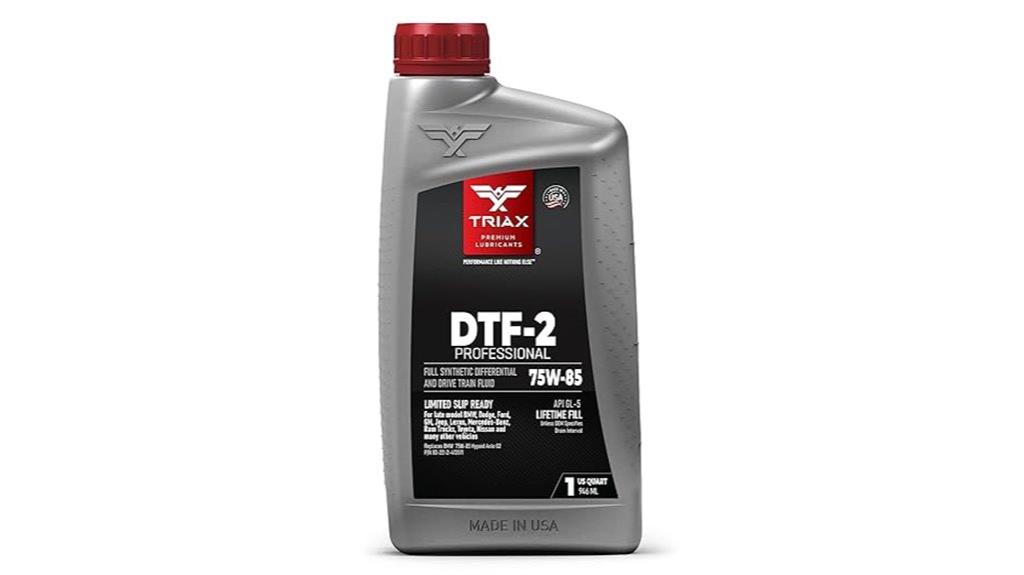
If you’re seeking a high-performance differential fluid compatible with a wide range of vehicles, TRIAX DTF-2 Synthetic Differential & Drivetrain Fluid stands out as an excellent choice. It’s designed for differentials, transfer cases, and gear systems across U.S., European, and Asian vehicles, including brands like BMW, Ford, Toyota, and Honda. This full synthetic fluid offers OEM-level protection, ensuring smooth gear shifts, friction stability, and protection against wear and corrosion. It performs reliably in extreme cold and heat, making it suitable for all climates. Many users report smoother operation and cost savings compared to dealership fluids, making it a versatile, high-quality option for long-term differential maintenance.
Best For: vehicle owners and mechanics seeking a versatile, full synthetic differential and drivetrain fluid compatible with a wide range of vehicle makes and models, including U.S., European, and Asian brands.
Pros:
- Provides OEM-level or superior protection for gear systems, ensuring smooth operation and high performance.
- Performs reliably in extreme temperatures, from -50°F cold to high heat conditions, suitable for all climates.
- Cost-effective alternative to dealership fluids with easy-to-use wide-mouthed bottles for straightforward refilling.
Cons:
- May require proper disposal of old fluid during servicing, which could be inconvenient for some users.
- Compatibility primarily with vehicles that meet OEM specifications; not suitable for all non-listed models.
- The blue color may be mistaken for other fluids or require careful handling to avoid contamination.
Mobil 1 Gear Oil 75W90 with Limited Slip Additive (1 qt)
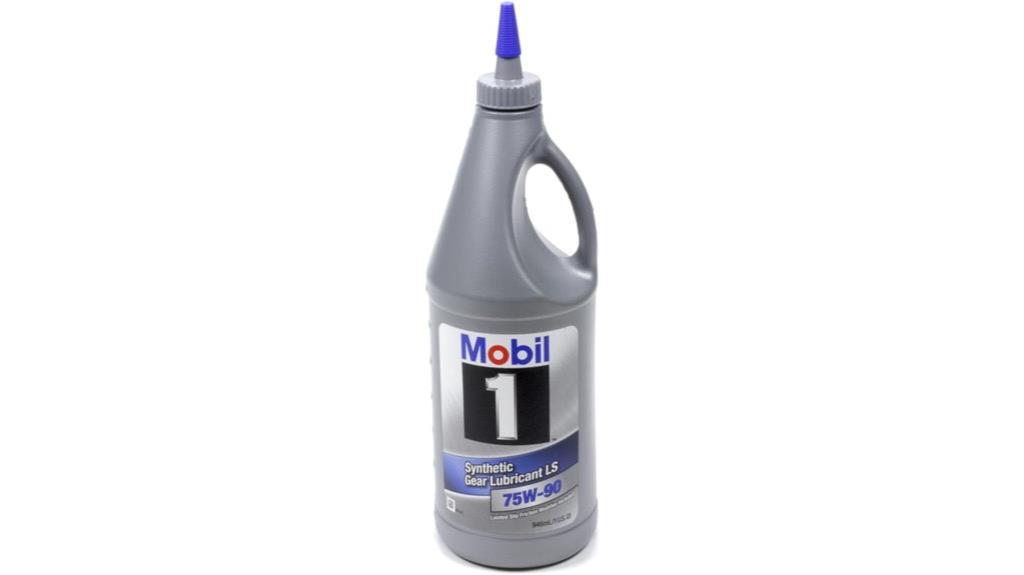
Designed for modern passenger vehicles, Mobil 1 Gear Oil 75W90 with Limited Slip Additive stands out as an excellent choice for those seeking reliable gear protection and smooth operation. This synthetic gear oil performs well across a wide temperature range, reducing noise, driveline drag, and differential temperatures. It’s ideal for SUVs, light trucks, and vehicles with limited slip differentials. Easy to apply and compatible with transfer cases, pumps, and differentials, it guarantees high-performance protection and longevity. Customers consistently praise its quieting effects and reliability, making it a top pick for routine maintenance and high-performance driving alike.
Best For: vehicle owners seeking reliable, high-performance synthetic gear oil for modern passenger vehicles, including SUVs, trucks, and vehicles with limited slip differentials.
Pros:
- Provides excellent protection and smoother operation across a wide temperature range
- Reduces noise, driveline drag, and differential temperatures for quieter, cooler performance
- Easy to apply and compatible with transfer cases, pumps, and differentials
Cons:
- Slightly more expensive than conventional gear oils, though still economical
- Requires a 50,000-mile change interval, which may be infrequent for some users
- Limited slip additive may not be compatible with all limited slip differentials without additional friction modifiers
Royal Purple Max Gear 75W-90 Synthetic Gear Oil
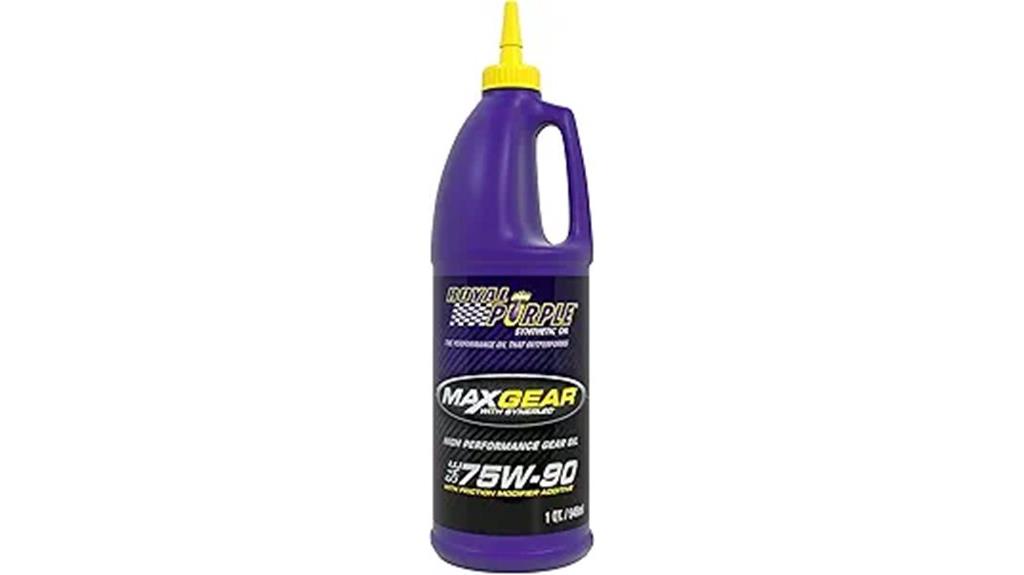
Royal Purple Max Gear 75W-90 Synthetic Gear Oil stands out as an excellent choice for anyone seeking high-performance lubrication for their vehicle’s differentials and gearboxes. It’s formulated with synthetic materials and hypoid friction modifiers, making it suitable for various applications, including front and rear differentials, manual transmissions, and gear units that specify API GL-4 or GL-5 fluids. Many users report smoother shifts, quieter operation, and improved gear protection, even in older or worn components. Its long-lasting performance helps reduce noise and heat, extending gear life. With a 4.8-star rating from over 1,400 reviews, it’s a reliable, versatile, and USA-made option for demanding driving conditions.
Best For: Vehicle owners and operators seeking high-performance synthetic gear oil for differentials, manual transmissions, and gear units requiring API GL-4 or GL-5 specifications.
Pros:
- Provides smoother shifts, quieter operation, and enhanced gear protection
- Long-lasting performance reduces noise and heat, extending gear life
- Safe for brass components and suitable for a variety of vehicles and machinery
Cons:
- Slightly higher cost compared to conventional gear oils
- May require specific compatibility checks for older or unique gear systems
- Availability may vary depending on retailer or location
Genuine Toyota 08885-02506 GL-5 75W-85 Differential Gear Oil
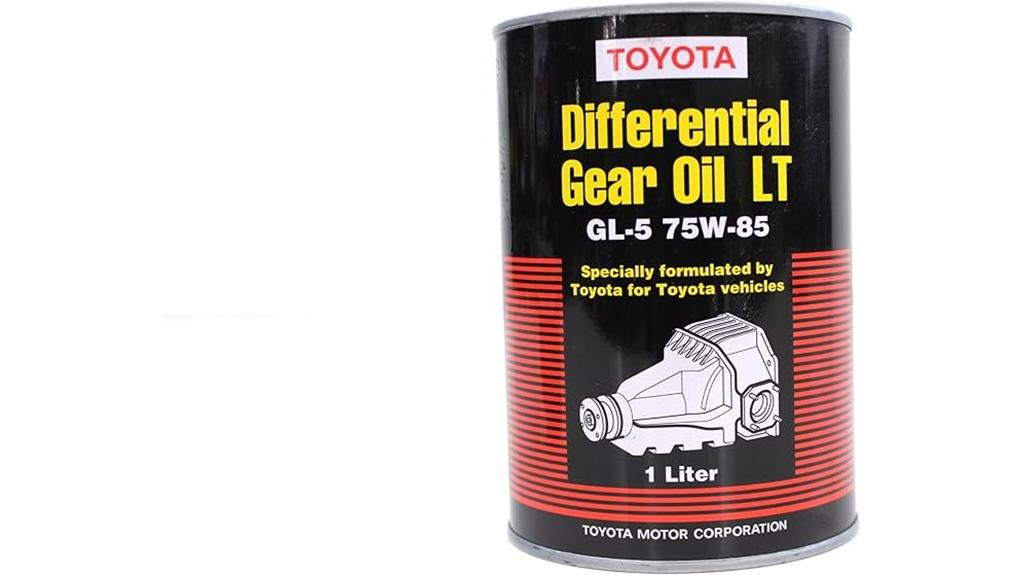
Genuine Toyota 08885-02506 GL-5 75W-85 Differential Gear Oil stands out as the ideal choice for Toyota vehicle owners who want OEM quality and reliable protection. This gear oil matches Toyota’s specifications, ensuring superior performance and compatibility. With a viscosity of 75W-85, it provides excellent lubrication and protects against wear and leaks. Packaged in a convenient 1,000-milliliter can, it’s made in Japan and highly rated by customers. Although it may be pricier, its authenticity and effectiveness make it worth the investment. Following manufacturer recommendations will help keep your differential running smoothly and extend its lifespan.
Best For: Toyota vehicle owners seeking OEM-quality differential gear oil for optimal lubrication, protection, and longevity of their vehicle’s drivetrain.
Pros:
- Meets OEM specifications for guaranteed compatibility and performance
- High customer ratings (4.6/5) indicating reliability and effectiveness
- Made in Japan, ensuring quality manufacturing standards
Cons:
- Can be expensive compared to generic alternatives
- Sealed can may require tools like a can opener or punch for access
- Not resealable, which might make storage and reuse less convenient
Mobil1 1043611 Full Synthetic Gear Lubricant, 75W-90 Quart 6 PK
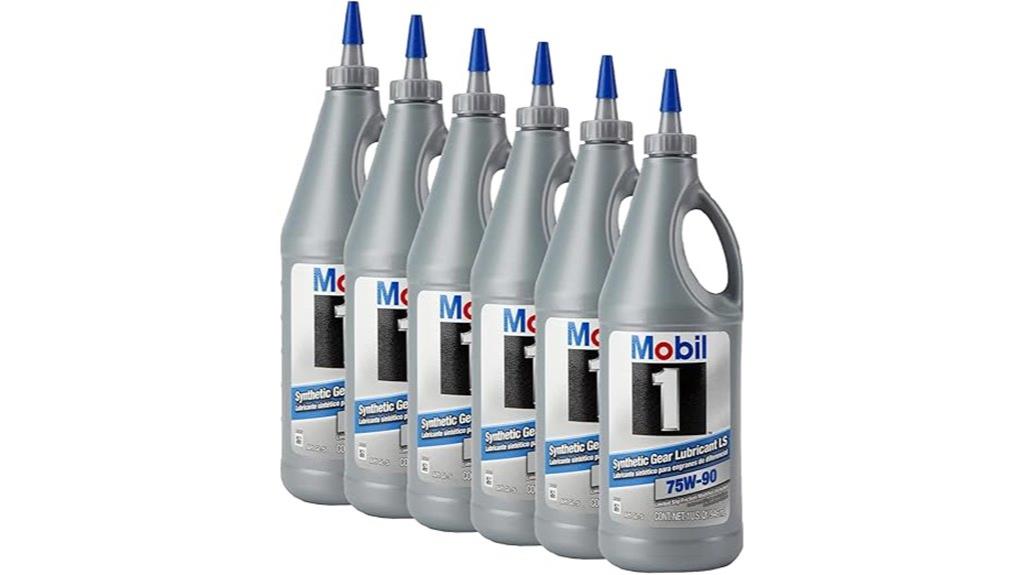
If you’re looking for a high-performance gear lubricant that can handle demanding driving conditions, Mobil 1 1043611 Full Synthetic Gear Lubricant, 75W-90 in a convenient 6-pack is an excellent choice. This synthetic gear lube is designed to meet or exceed the highest standards for modern passenger vehicles, including limited slip applications. It offers outstanding power transfer, even under severe conditions, and protects against thermal degradation, wear, and corrosion. Its reliable formulation promotes consistent performance and viscosity retention, ensuring your gears stay protected and efficient. The six-pack makes it versatile for multiple vehicles or fleet use, providing excellent value and peace of mind.
Best For: those seeking a high-performance, synthetic gear lubricant suitable for demanding driving conditions and multiple vehicle applications.
Pros:
- Meets or exceeds high-performance standards for modern passenger vehicles and limited slip applications
- Offers excellent protection against thermal degradation, wear, corrosion, and viscosity loss
- Comes in a convenient 6-pack, ideal for fleet use or multiple vehicle needs
Cons:
- May be more expensive than conventional gear lubricants
- Requires proper disposal or recycling due to synthetic formulation
- Not suitable for use in vehicles with specific gear lubricant requirements that specify different viscosity grades
10 CC Fluid Pump for Quart Bottles
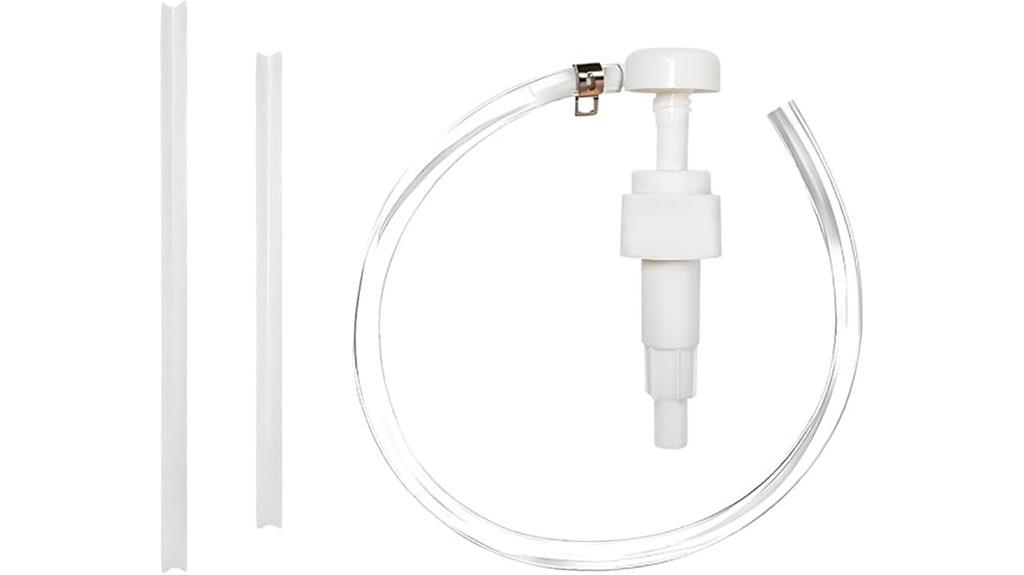
The 10 CC Fluid Pump for Quart Bottles stands out as an essential tool for anyone needing precise and spill-free transfer of gear oil, transmission fluid, or differential fluid. Its 4cc per stroke capacity allows for accurate dosing, minimizing mess and waste. Made from durable, heat-resistant PP material, it’s built to last through repeated use. The pump installs easily—just insert and tighten—and comes with flexible and hard suction tubes that fit various bottle heights and tight spaces. Its spill-proof spout and compact design make fluid transfer straightforward and clean, whether you’re a professional or a DIY enthusiast.
Best For: DIY automotive enthusiasts and professionals seeking precise, spill-free transfer of gear oil, transmission fluid, or differential fluid in various bottle sizes and tight spaces.
Pros:
- Precise 4cc per stroke dosing minimizes spills and waste
- Durable PP material ensures heat resistance and impact durability for long-term use
- Compatible with various quart bottle heights thanks to adjustable, flexible, and hard suction tubes
Cons:
- Some users may experience minor challenges during installation of the bottom tube
- Limited to use with quart-sized bottles, not larger containers
- Small size may require multiple pumps for larger fluid transfer tasks
Factors to Consider When Choosing Differential Fluids
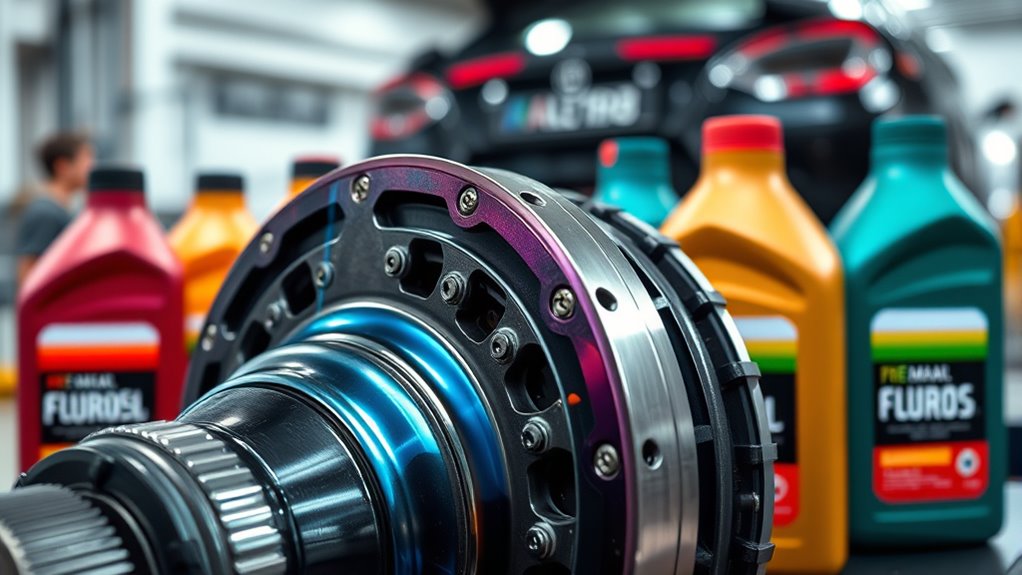
When selecting a differential fluid, I always check for compatibility with my vehicle model to guarantee proper performance. I also consider viscosity and temperature range to keep the gears protected in different conditions, along with OEM standards to meet manufacturer requirements. Finally, I look at additive types that offer extra protection for gear materials and overall durability.
Compatibility With Vehicle Models
Choosing the right differential fluid for your vehicle hinges on guaranteeing compatibility with your specific make and model. First, check that the viscosity grade, like 75W-90 or 80W-90, matches what your manufacturer recommends. Next, verify that the fluid meets or exceeds OEM standards, such as API GL-4 or GL-5, to ensure proper protection and performance. It’s also important to consult your vehicle’s owner’s manual or OEM documentation to confirm the fluid’s suitability for your car’s age, make, and model. Additionally, make sure the fluid is compatible with any materials in your differential, like brass or copper alloys, to prevent corrosion. Using a fluid tailored to your vehicle guarantees excellent operation and longevity of your differential system.
Viscosity and Temperature Range
Selecting the right viscosity and temperature range for your differential fluid is essential because it directly affects how well the fluid performs under different driving conditions. Viscosity ratings like 75W-90 show how the fluid flows at cold start and operating temperature—lower numbers mean better cold flow. The temperature range indicates the minimum and maximum temperatures where the fluid can provide ideal lubrication and protection. Synthetic gear oils typically offer broader temperature ranges and better thermal stability than conventional oils, making them suitable for extreme conditions. Proper viscosity ensures the fluid resists thermal expansion and contraction, preventing gear wear or breakdown. Choosing a fluid with a temperature range suited to your environment helps avoid issues like thickening in cold weather or thinning at high temperatures, ensuring smooth operation.
Additive Types and Benefits
Different additive types play a vital role in enhancing the performance and protection of differential fluids. Extreme pressure (EP) additives create a protective film on gear surfaces, preventing metal-to-metal contact during high loads or shocks. Anti-wear additives, like ZDDP, help reduce gear surface wear and extend component life. Friction modifiers improve clutch engagement and shift smoothness, especially in limited slip or cone-type differentials. Choosing the right additive depends on your gear system, operating environment, and material compatibility—such as brass or copper components. Understanding these additive types helps ensure you select a fluid that offers optimal protection, reduces wear, and maintains smooth operation. Proper additive formulation can make a significant difference in your differential’s longevity and overall vehicle performance.
OEM Standards Compliance
Have you ever wondered if your differential fluid meets the necessary standards for peak performance? Ensuring OEM standards compliance is essential when choosing the right fluid. These standards, like API GL-4, GL-5, or manufacturer-specific specs, guarantee compatibility with your vehicle’s components. Using compliant fluids helps prevent damage, maintains your warranty, and guarantees your differential operates smoothly. OEM standards specify important properties such as viscosity, additive content, and temperature resistance, all tailored to your vehicle’s specific design. Additionally, fluids that meet these standards are rigorously tested for durability, oxidation stability, and frictional performance. By selecting OEM-approved differential fluids, you’re investing in ideal gear protection, extending the lifespan of your differential, and guaranteeing reliable, safe operation under demanding conditions.
Protection for Gear Materials
When choosing a differential fluid, protecting the gear materials from wear and damage is essential, especially under high-stress conditions. I look for fluids with anti-wear and extreme pressure additives that prevent metal-to-metal contact during heavy loads. Compatibility with gear materials like brass, copper, and aluminum alloys is critical to avoid corrosion or damage over time. Proper viscosity ensures a strong film that shields gears from fatigue and wear. I also check for shear stability, which helps maintain protective film thickness during prolonged stress. Additionally, corrosion inhibitors are necessary to guard against rust and oxidation, extending the lifespan of the gears. Overall, selecting a fluid with these protective qualities ensures my differential remains reliable and performs best, even under demanding conditions.
Ease of Application Process
Choosing a differential fluid with an easy application process can save time and prevent frustration. Look for containers with wide-mouth openings and nozzles designed for smooth pouring, especially into tight or hard-to-reach fill ports. Pre-measured bottles or self-priming pumps help streamline the process, reducing mess and waste while ensuring consistent filling. Compatibility with standard tools like pumps or syringes simplifies transferring fluid, especially for larger or sealed containers. Clear instructions and well-designed packaging also make application quicker and more accessible, whether you’re a DIY enthusiast or a professional technician. Ease of application not only saves effort but also minimizes errors, ensuring your differential gets the right amount of fluid without hassle. This factor is essential for a smooth, efficient maintenance experience.
Price and Brand Reputation
Ever wondered why brand reputation matters when selecting differential fluids? Well, trusted brands often produce higher-quality products that meet or surpass OEM standards. They tend to deliver consistent performance and reliability, which reduces the risk of differential damage or failure. Premium-priced fluids from reputable brands usually include advanced additives that improve lubrication, protection, and longevity. While budget brands might seem tempting due to lower prices, their quality can vary, potentially leading to inadequate protection or shorter service intervals. Investing in well-known brands not only ensures better performance but also provides better warranty support and customer service. When you choose a reputable brand, you gain confidence that your differential will operate smoothly and last longer, saving you money and hassle in the long run.
Drain Interval and Longevity
The lifespan of differential fluids depends heavily on driving conditions and how well you maintain them. For most vehicles, drain intervals typically range from 30,000 to 60,000 miles, but this can vary. Synthetic gear oils usually last longer, often up to 100,000 miles or more under normal driving conditions. However, heavy-duty use, towing, or off-road driving can accelerate fluid deterioration, requiring more frequent changes to prevent gear wear and thermal breakdown. Regularly inspecting or testing the fluid helps determine when it’s time for a change, especially if contamination or deterioration signs appear. Following your manufacturer’s recommended drain intervals is vital for maximizing gear protection and avoiding costly damage caused by degraded fluid. Proper maintenance ensures smooth operation and longevity of your differential.
Frequently Asked Questions
How Often Should I Change My Differential Fluid?
You’re wondering how often to change your differential fluid, right? I recommend checking your vehicle’s owner manual, but generally, I suggest every 30,000 to 60,000 miles. If you often tow heavy loads or drive in harsh conditions, more frequent changes might be necessary. Regularly inspecting the fluid’s condition helps guarantee your differential stays well-lubricated and performs smoothly. Staying on top of this maintenance keeps your car running reliably.
Can I Mix Different Brands of Differential Fluids?
Imagine pouring different paints into the same palette—things might get muddy. I wouldn’t mix different brands of differential fluids because each has unique additives and formulations. Combining them could cause chemical reactions that reduce lubrication or cause corrosion. For the best performance, I stick to one trusted brand and follow the manufacturer’s recommendations. It’s like keeping my car’s heart in harmony, ensuring smooth, reliable rides every time.
What Are Signs of Differential Fluid Failure?
When your differential fluid starts to fail, I notice strange noises like whining or grinding, especially during turns. You might also feel vibrations or hesitation while driving. Another sign is an increase in fluid temperature or leaks under your vehicle. If you experience any of these, it’s time to check and possibly replace the differential fluid. Staying attentive helps prevent costly damage and keeps your car running smoothly.
Does Differential Fluid Affect Fuel Economy?
They say a chain is only as strong as its weakest link, and that’s true for your car’s differential fluid. Yes, it can affect fuel economy—when the fluid gets old or contaminated, it causes increased resistance, making your engine work harder. Regularly changing it keeps everything running smoothly, like a well-oiled machine, saving you fuel and preventing costly repairs down the line.
Is Synthetic Differential Fluid Better Than Conventional?
You’re wondering if synthetic differential fluid is better than conventional, right? I believe it generally is because synthetic fluids offer better lubrication, flow at lower temperatures, and last longer. They also reduce wear and tear on your differential components. While they cost more upfront, I think the durability and performance benefits make synthetic fluids a smarter choice for keeping your car running smoothly over time.
Conclusion
Choosing the right differential fluid is vital for your car’s smooth operation and longevity. I get it—sorting through options can be overwhelming. But trust me, investing in quality fluid pays off by preventing costly repairs down the line. Even if it seems like a small detail, using the recommended type guarantees your vehicle performs its best. Don’t overlook this simple step—your car will thank you for it!
